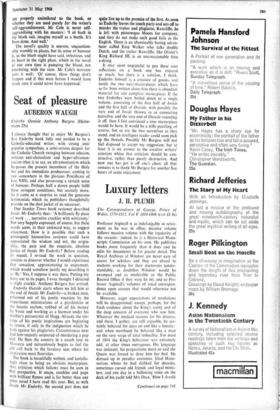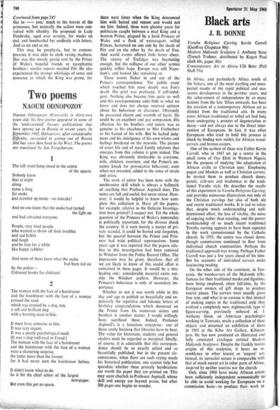The Correspondence of George, Prince of Wales, 1770-1812, Vol V
1804-1806 (cue £8 8s)
Luxury letters
J. H. PLUMB
Professor Aspinall is as indefatigable in retire- ment as he was in office, massive volume follows massive volume with the regularity of the seasons: indeed, he is a Historical Manu- scripts Commission on his own. He publishes books more frequently than it does and he edits his documents in far greater detail. The Royal Archives at Windsor are never easy of access for scholars and they are closed to students working for their doctorates (under- standably, as doubtless Windsor would be swamped and as intolerable as the Public Record Office if they were let in), and so Pro- fessor Aspinall's volumes of royal correspon- dence open sources that would otherwise not be available.
However, eager expectations of revelations will be disappointed; except, perhaps, for the fresh evidence about the King's sanity and of the deep concern of everyone who saw him. Whatever the medical reasons for his distress, and these, I gather, are still arguable, he cer- tainly behaved for days on end like a lunatic: and when moribund he behaved like a man on the very verge of total imbecility. For most of 1804 the King's behaviour was extremely odd, at other times outrageous. His language was indecent, his propositions more so and the Queen was forced to deny him her bed. He dressed up in peculiar costumes, feted Hano- verians whom he had disliked for decades, sometimes cursed old friends and loyal minis- ters, and one day in a bellowing voice on the deck of his yacht told Mrs Drax, 'How I should
Continued on page 748 Continued from page Z45 like to — you,' much to the horror of the princesses, but naturally the sailors were con- vulsed with ribaldry. He proposed to Lady Pembroke, aged over seventy, for weeks on end, and bombarded her endlessly with letters. And so on and so on.
This may be porphyria, but to contem- poraries it was akin to stark raving madness. ,Nor was this merely gossip sent by the Prince of Wales's hopeful friends or sycophantic brothers : similar reports reached Pitt. He also experienced the strange whirligigs of sense and nonsense to which the King was prone, for there were times when the King denounced him with hatred and venom and would not see him. Indeed, these were gloomy years for politicians caught between a mad King and a wanton Prince, plagued by a lurid Princess of Wales and a flock of extravagant, wilful Princes, harrowed on one side by the death of Pitt and on the other by the death of Fox. And world events offered little better cheer. The victory of Trafalgar was heartening enough, but the collapse of our allies' armies quickly stifled hope. Europe was still Napo- leon's, and looked like remaining so.
These events flicker in and out of the Prince's correspondence. The public event which touched him most deeply was Fox's death. His grief was profound, if self-indul- gent. Nothing else became him quite so well and this correspondence adds little to what we know and does not change received opinion about his behaviour or character. Obviously he possessed charm and warmth of heart. He could be an excellent and gay companion. His affection for his brothers and sisters was as genuine as his attachment to Mrs Fitzherbert or his hatred of his wife. But he lacked judg- ment and his indulgence of his own whims and feelings bordered on the neurotic. The picture of court life and of royal family relations that emerges from this volume is grim indeed. The King was obviously intolerable to everyone, wife, children, courtiers, and the Prince's un- canny knack for provocative behaviour, even when not intended, added to the sense of strain and crisis.
The work of editor has been done with the unobtrusive skill which is always a hallmark of anything that Professor Aspinall does. The notes are full and useful, but never otiose. How- ever, it would be helpful to know how com- plete this collection is. Have all the papers, for example, relative to the Delicate Investiga- tion been printed? I suspect not. Yet the whole question of the Princess of Wales's immorality is politically important, for the divorce shook the country. If it were merely a matter of pri- vate scandal, it could be buried and forgotten, but the quarrel between the Prince and Prin- cess had wide political repercussions. Some years ago it was reported that the papers rela- tive to this investigation had been removed to Windsor from the Public Record Office. The impression may be given, therefore, that all we are likely to know of this sordid affair is contained in these pages. It would be a mis- leading one : considerable material exists out- side the Windsor archive. However, the Princess's behaviour is only of secondary im- portance. - Whether or not it was worth while in this day and age to publish so beautifully and ex- pensively the repetitive and fulsome letters of birthday congratulations which showered on the Prince from his numerous sisters and brothers is another matter. I would willingly have sacrificed these. Indeed, Professor Aspinall's is a luxurious enterprise : one of those costly burdens that libraries have to bear. The value for historians, students and general readers must be regarded as marginal. Ideally, of course, it is admirable that this correspon- dence should be so exactly edited and so beautifully published, but in the present cir- cumstances, when there are such crying needs for historical publication, one cannot help but speculate whether these princely lucubrations are worth the paper they are printed on. This may seem churlish to Professor Aspinall, whose skill and energy are beyond praise, but after SOO pages one begins to wonder.







































 Previous page
Previous page